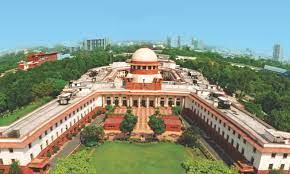


The Supreme Court in the matter which pertains to the dispute between the Delhi government and the union government with regards to the control of administrative services in the National Capital Territory of Delhi observed and has held that the National Capital Territory of Delhi has legislative power and executive power over the administrative services in the National Capital, which excludes the said matter which relates to the public order, the police and land.
The constitutional bench comprising of Chief Justice DY Chandrachud, Justice MR Shah, Justice Krishna Murari, Justice Hima Kohli and Justice PS Narasimha in the case observed and has disagreed with the view of Justice Ashok Bhushan’s in the 2019 split verdict, wherein it has been stated by Justice Ashok Bhushan’s that the said services were totally outside the purview of the Delhi Government.
The bench in the case observed and has stated if the services are being excluded from its legislative and its executive domain, the Ministers and the Executive who are being charged with formulating policies which being in the territory of National Capital Territory of Delhi, NCTD would also be excluded from controlling the civil service officers who implement such executive decisions.
Further, the court in the case observed and has held that the ideal conclusion would be that GNCTD ought to have control over services, wherein subject to exclusion of subjects which are being out of its legislative domain. Thus, the executive power and the legislative power of National Capital Territory of Delhi, NCTD over entry 41 shall not be extended over to services which relates to public order, police and land and the legislative and executive power over services such as Indian Administrative Services or the Joint Cadre Services which are relevant for the implementation of policies and the vision of the National Capital Territory of Delhi, NCTD in terms of day-to-day administration of the region, thus it shall lie within the NCTD.
The bench headed by CJI Chandrachud in its judgement stated that in light of the Article 239AA of the Constitution and the 2018 Constitution Bench judgment, the Lieutenant Governor is being bound by the aid and advice of the Council of Ministers of NCTD in relation to matters within the legislative scope of NCTD, as the said court had held that NCTD has legislative power over services excluding public order, police and land.
The court in the case also stated that as it is stated under Entry 41 List 2, the Lieutenant Governor shall be bound by the decisions of GNCTD on services as it is explained above. Further, in order to clarify any reference to Lieutenant Governor over Services excluding services which relates to public order, Police and land in relevant rules shall mean Lieutenant Governor acting on behalf of NCTD.
It has also been stated by the CB that the legislative assembly of Delhi embodies the principle of representative democracy, the power is been given to the Delhi assembly to legislate to represent the will of the people. Therefore, the Article 239AA of the Constitution of India must be interpreted in a manner to further the interest of representative democracy.
Accordingly, the said court is of the opinion that if the officers feel they are insulated from the control of the government, the same will dilute accountability and affect governance and it has also been remarked by the CB that in a democratic form of government, the real power of administration must rest on the elected arm of the government.